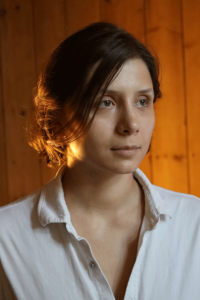Ode to Ada (2023) / Yanina Zaichanka
In this project Yanina Zaichanka is studying and exploring the implications of unthinking people out of the public memory and the notions of (in)visibility in the digital era. The artist also meditates on the people behind the technologies (read: women) who have been forgotten while their work lives on. As Ada Lovelace once wrote, “That brain of mine is something more than merely mortal as time will show.” Ironically, her input into the development of computers and programming has very often been downplayed and only relatively recently has her figure reemerged in public discussions, articles, and books.
History is still overwhelmingly written down as his story, with the lives of women often being omitted. As Linda Nochlin claims in her influential 1971 essay “Why Have There Been No Great Women Artists?”, it was next to impossible for people who were not middle-class white men to achieve any renown. Yet still it doesn’t mean that other identities did not contribute. Even though there have not been many “great” women, there have been women. They still haunt public memory like defective pixels that persist in manifesting themselves, distorting the “whole” picture, and disturbing the status quo.
However, there is a difference between being seen and being observed. In the era of surveillance capitalism, people are the product rather than the subject of technology, and their lives and experiences are reduced to faceless numbers and potential profits. Big data is too big to pay attention to detail. Information seems to be easily accessible, but at the same time, nuances are often overlooked.
Seemingly objective technologies in the hands of those who desire to maintain their own status in power can and do lead to human rights violations. Authoritarian regimes have been using “state-of-the-art” technologies to control people. One of the recent examples is the 2020 protests connected with the presidential elections in Belarus. Then, the regime employed internet shutdowns to disinform the citizens, and AI face recognition features and data from social media were used to trace down people who disagreed with the rigid power structure. People are serving their sentences in prisons for Orwellian thought crimes.
Ada Lovelace was using the phrase “poetical science” when talking about her holistic approach to the world around her. It’s very likely that it was this unconventional approach that led her to think into existence the first computer program at the age when people could barely imagine some basic uses for a calculating engine. Paying homage to Lovelace, Zaichanka suggests a new term, “poetical technology,” to address the missing link between the Humanities and STEM. New technologies appear every day, presenting endless possibilities, but too few are made to benefit people rather than big corporations. In view of this, bringing in the Humanities to the development of technologies could turn them in a more ethical and humane direction.
Drawing inspiration from Sadie Plant’s book “Zeros + Ones: Digital Women + the New Technoculture,” remembering the connections between the weaving loom and first programs, and employing cross-stitching as an analog predecessor of pixels, Zaichanka creates a series of portraits of the willingly and unwillingly invisible people. People forget; algorithms do not. Could it get to be otherwise?
 Yanina Zaichanka (BY) is a Belarusian artist who is currently studying at the Oslo National Academy of the Arts. Prior to moving to Oslo, she had been actively involved in the contemporary art scene in Minsk. In 2018-2019, she studied Contemporary Art and Drama at the European College of Liberal Arts in Belarus. Her work has been shown at several solo exhibitions, including Untitled at the gallery Seilduken 2 in Oslo (2023), the Freedom (of Speech) from the Unbearable at Pradmova Festival of Intellectual Literature in Minsk (2020), and Being a Woman at ECLAB in Minsk (2019). Zaichanka has contributed to group shows, among others – Solarpunk Festival Exhibition at Kinogalleriet in Rjukan (2023), Solidarity with political prisoners in Belarus at Sophus Bugges Hus in Oslo (2023), CIAHLITSY, an exhibition of queer art in Minsk and Brest (2019), and Halasy, exhibition of art de-stigmatizing people with mental health conditions (2019). The artist has also taken part in several art residencies and projects, the most recent being Solarpunk Campus Summer School in Rjukan (2023), I CONSENT Summer School at UKS in Oslo (2023), and R22: Repression – Expression // Violence – Creative Resistance at PRAKSIS in Oslo (2022).
Yanina Zaichanka (BY) is a Belarusian artist who is currently studying at the Oslo National Academy of the Arts. Prior to moving to Oslo, she had been actively involved in the contemporary art scene in Minsk. In 2018-2019, she studied Contemporary Art and Drama at the European College of Liberal Arts in Belarus. Her work has been shown at several solo exhibitions, including Untitled at the gallery Seilduken 2 in Oslo (2023), the Freedom (of Speech) from the Unbearable at Pradmova Festival of Intellectual Literature in Minsk (2020), and Being a Woman at ECLAB in Minsk (2019). Zaichanka has contributed to group shows, among others – Solarpunk Festival Exhibition at Kinogalleriet in Rjukan (2023), Solidarity with political prisoners in Belarus at Sophus Bugges Hus in Oslo (2023), CIAHLITSY, an exhibition of queer art in Minsk and Brest (2019), and Halasy, exhibition of art de-stigmatizing people with mental health conditions (2019). The artist has also taken part in several art residencies and projects, the most recent being Solarpunk Campus Summer School in Rjukan (2023), I CONSENT Summer School at UKS in Oslo (2023), and R22: Repression – Expression // Violence – Creative Resistance at PRAKSIS in Oslo (2022).
Zaichanka has been working on different topics, ranging from political oppression and collective trauma to environmental and historical justice. Her artistic practice includes embroidery, sewing, ceramics, as well as painting and performance.